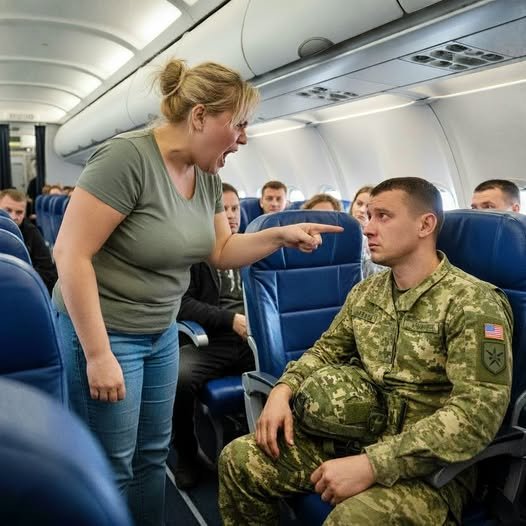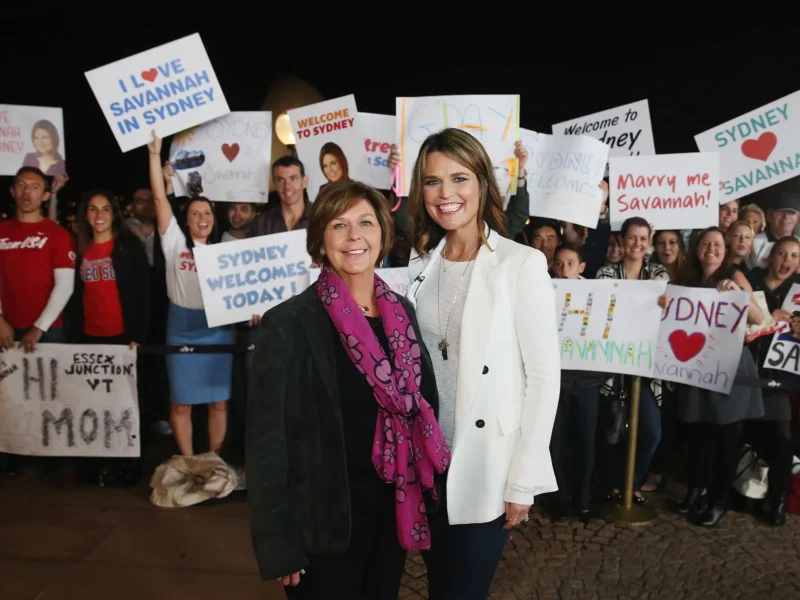The next day, the cabin filled with the familiar, dull roar of passengers settling in. It was a late shuttle, a short hop from Philadelphia to Boston—the kind of routine trip where no one expected surprises.
Among those boarding, a tall man in a crisp military uniform stood out. His U.S. Army OCP camouflage was instantly recognizable. He moved with a quiet purpose, eliciting involuntary respect even as he tried to keep a low profile. Offering a brief nod to the flight attendants, he made his way to his seat.

A couple of rows ahead, a woman in her fifties, wearing a high-end designer blazer, radiated an air of self-importance. She adjusted the expensive handbag on her lap, glancing around as if mentally sorting the passengers by status.
Her gaze lingered on the soldier as he stowed his backpack. Her expression shifted—a faint, barely perceptible smirk—before she turned back to her phone. As he sat down, she turned halfway and said, just loud enough for her neighbors to hear, “You’d think they’d seat people like that separately. Really, a uniform… It doesn’t mean what it used to.”
A sudden tension thickened the air. Passengers exchanged uneasy looks, unsure how to respond to such a blatant lack of tact. The soldier himself seemed oblivious, or perhaps he had chosen to ignore it; he was focused on fastening his seatbelt. Her words lingered, heavy and awkward. No one dared to call her out. The jab felt completely uncalled for, a needless poison in the cabin.
The plane climbed to cruising altitude, but the discomfort didn’t dissipate; it hung in the air, thick and electric like static. When the “fasten seatbelt” sign dinged off, the woman’s irritation only seemed to mount. She shifted, casting disapproving glances toward the soldier that were impossible to miss. “It’s odd, don’t you think?” she whispered to her seatmate, an older man in a bright polo shirt who looked profoundly uncomfortable. “Shouldn’t they be flying on military transports? My grandfather fought in the war. He knew what real service meant.” The man just shrugged, unwilling to engage, but she wasn’t deterred. “I’m just saying, anyone can wear the outfit nowadays. It doesn’t automatically make you a hero.”
Her words carried further than she might have intended—or perhaps that was her goal. A woman across the aisle looked up from her book, her brow furrowed. A young couple two rows back exchanged an uneasy glance. The soldier, however, remained perfectly still. His attention was riveted on an old, worn-looking notebook in his lap. He was writing something—maybe a letter, maybe just notes—and the task consumed him entirely. He didn’t flinch or look in her direction.
His lack of reaction frustrated her even more. She pressed the call button. A young flight attendant, her name tag reading “Emily,” arrived promptly. “Yes, ma’am, how can I help?”
“I’d like to change seats,” the woman declared, gesturing vaguely toward the soldier. “I’d prefer to sit somewhere… quieter.”
Emily’s professional smile tightened. “I’m very sorry, ma’am, but it’s a completely full flight. ..
There are no other seats available.”
The woman heaved a theatrical sigh dripping with disdain and waved a dismissive hand. “Fine. I suppose I’ll just have to endure the situation.”
Passengers nearby shifted uncomfortably. A man in his thirties leaned over to his wife and whispered, “What is her deal?” But the unspoken rules of air travel kept everyone quiet. Through it all, the soldier remained a picture of calm. He continued to write, pausing occasionally to stare out at the vast white expanse of clouds, as if searching for answers. Whatever was in that notebook was far more important than the petty barbs thrown his way. His silence only seemed to fuel her confidence.
When the beverage cart came around, she let another passive-aggressive comment fly, directing it at Emily but ensuring everyone could hear. “I guess standards have really slipped. I can’t imagine my grandfather, in his day, being seated next to just… anyone.”
Emily froze for a beat before her training kicked in. “What can I get for you, ma’am? Coffee, tea?”
“Black coffee,” the woman snapped, irritated by the lack of a broader reaction. “No cream, no sugar.”
The soldier, when his turn came, simply asked for a water and offered Emily a kind, genuine smile. “Thanks,” he said, his voice low and firm.
Emily smiled back, a look of genuine relief flashing across her face at the simple, normal interaction.
As the short flight progressed, the woman continued to mutter barely-veiled complaints. She griped about the service, the seat pitch, the air conditioning—and every complaint felt like another indirect jab. The atmosphere grew thick with unspoken resentment, but no one could have guessed how quickly the mood was about to shift.
Through it all, the soldier remained steadfast. He sat quietly, his broad shoulders relaxed, his gaze fixed on his notebook. The corners of his mouth occasionally twitched—not quite a smile, but something more pensive, melancholic.
He had learned long ago how to ride out storms like this. He was young, probably in his early thirties, with a strong jawline and resolute eyes. His uniform was slightly worn—a faded thread here, a mark of long use there—but it was impeccably clean, as if it meant more to him than just a work requirement.
At one point, a little boy of about five, sitting in the row ahead, turned around and stared, gripping the seatback with small hands. “Are you a real soldier?” he asked, his voice full of awe.
The soldier looked up, and his entire demeanor softened. “Yeah, buddy, I am,” he answered with a kind smile.
The boy’s mother quickly apologized, “I’m so sorry, he’s just very curious.”
“It’s no problem at all,” the soldier reassured her warmly. “Asking questions is a good thing.”
The little boy beamed. “Do you fight the bad guys?”
The soldier paused, his smile faltering for a second. “I help protect people,” he said carefully, with a quiet modesty that was louder than any boast…Relationship Counseling Services
This brief, gentle exchange did not go unnoticed. Passengers who had been casting curious glances now looked at him with a warmer light. The woman in the designer blazer, however, remained unimpressed. She rolled her eyes and muttered something about him “playing the hero.” The soldier didn’t react, turning back to his notebook. A few rows back, Emily whispered to her colleague, “That man has more patience than anyone I’ve ever met.”
She was right. It wasn’t that he hadn’t heard. He had simply refused to engage. Maybe he had heard it all before. Maybe he knew there were battles worth fighting, and this wasn’t one of them. Or maybe he was carrying a burden so heavy that her petty words couldn’t find purchase.
As the plane began its descent into Boston, the soldier carefully put his notebook away. He reached into his pocket and pulled out a small, simple velvet box. He held it almost reverently, as if it were made of glass. For a moment, his composed mask cracked, replaced by something far deeper—a wave of grief, or perhaps profound respect. The box was plain, but it clearly held immense meaning. People nearby noticed, but no one dared break the respectful silence.
The soldier closed his eyes, taking a deep, steadying breath. When he opened them, his composure was back, as if he’d drawn strength from whatever memory the box held. No one on that flight understood the weight of that moment. Not even the woman. Not until the next day.
The next morning, sunlight streamed into an expensive-looking home in Wellesley. The woman from the flight sat at her large kitchen island with a cup of coffee, idly scrolling through her phone. The flight was already a distant memory. But one news story stopped her cold.
The headline jumped off the screen: “Army Sergeant Returns Home on Final Mission, Escorting His Fallen Brother-in-Arms.” She froze, her finger hovering. Something about the photograph looked familiar. She tapped the link, and her breath caught. It was him. The soldier. His calm eyes stared back from the screen.
The article told his story. Staff Sergeant Michael Sullivan was returning home after a difficult deployment. He was transporting the remains of his best friend, Sergeant Steven Miller, killed in action. That small velvet box, the article explained, held Sergeant Miller’s dog tags—a priceless keepsake for his grieving family. The more she read, the heavier her heart became. Michael and Steven had been friends since childhood. They had enlisted together, promising to always have each other’s back.
That promise had been tested on their final mission—an evacuation that went sideways. Steven had shielded Michael from an explosion, sacrificing his own life. It was Michael who had carried his friend’s body from the field, and it was Michael who was now bringing him home.
The words began to blur as tears welled in her eyes. Her mind flashed back to the flight, to every poisonous, condescending remark. She remembered how he had sat there, perfectly calm, never saying a word…
She understood it now. He wasn’t ignoring her out of arrogance. He was submerged in a grief so profound that her petty digs simply couldn’t reach him. She put her phone down and stared into her now-cold coffee. A wave of guilt washed over her—heavy, suffocating. She had judged him without knowing a single thing. And in response, he had shown nothing but quiet, unshakeable dignity.
The article ended with a quote from Michael: “Steve wasn’t just my best friend. He was my brother. Bringing him home is the last thing I can do for him.”
The woman’s chest tightened. She thought of her own brother, lost years ago in a car accident. She remembered that hollowed-out pain. How could she, knowing that pain, have been so cruel?
The weight of her actions pressed down. For the first time in years, she felt a burning, undeniable shame. Looking out at her perfect lawn, she knew that feeling guilty wasn’t enough. She had to do something.
She replayed the entire flight in her head. Every word now felt like a shard of glass. His unflappable poise stood in stark contrast to her behavior. Her fingers trembling, she scrolled further down the article. There was another photo: Michael in his dress uniform, standing beside a flag-draped casket. His face was stoic, but his eyes held a sadness no words could capture.
The woman could no longer hold back her tears—tears of shame and deep remorse. She thought about her grandfather, a WWII veteran, and his stories of unbreakable brotherhood. And she had humiliated a man honoring that very bond, bought at the highest price.
His silence wasn’t weakness; it was incredible strength. He had refused to be dragged down. In his silence, he had taught her a lesson in nobility she didn’t deserve.
She spent the morning online. By noon, she had found it: a small charitable foundation Michael had established in Steven’s name, dedicated to supporting the families of their fallen unit members…
Her heart ached as she read the stories. She opened the donation page and made a very large contribution. Her hands shook as she typed an optional message.
It was short, but sincere: “Staff Sergeant Sullivan, I didn’t know your story on the flight, but I do now. Thank you for your service, and thank you for showing me what real strength looks like. Please forgive my words. I will carry this lesson with me for the rest of my life.”
After she hit ‘send,’ she knew it was only a first step. She couldn’t erase what she’d done, but she could choose to be better.
Later, watching the sunset from her porch, she still felt the guilt, but it was now mixed with resolve. She had seen the worst version of herself and was determined to change. It wasn’t just about the soldier. It was about what kind of world she wanted to help build.
The days that followed were no longer routine. Every time she picked up her coffee, she remembered Staff Sergeant Sullivan and his silent lesson. His strength hadn’t been in his uniform, but in his unbending dignity.
She tried to apply that lesson. At work, she listened instead of criticizing. She chose kindness over sharp efficiency. She reconnected with old friends. Slowly, the heavy guilt began to transform into fuel for positive change.
Michael Sullivan never replied, but she hadn’t expected him to. Her apology was an acknowledgment of her failure. She just hoped her contribution would, in some small way, help.
Life went on, but it was different. The woman who had once been so quick to judge was now learning to understand. You couldn’t rewrite the past, but you could build a future on compassion.
If this story touched you, just remember: every interaction we have is a choice. Let’s try to make choices we can be proud of.


